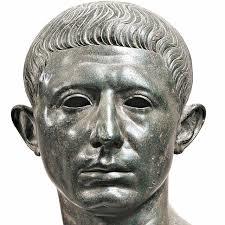
MARCUS PORCIUS CATO UTICENSIS, or Cato Minor, is a statesman in the late Roman Republic. He is also a follower and enthusiast of the Stoic philosophy. A valued speaker, he very often displays stubbornness and tenacity, especially in his lengthy conflict with Julius Caesar. Incorruptible attitude, moral integrity and a famous distaste for dishonesty are among his notable features. His epithet “the Younger” distinguishes him from his great-grandfather, Cato the Elder.
At the basis of Cato’s own philosophy lies the value of acting in the name of duty and service, with no regard to the future. He thinks that everybody has to play an active part. However when one is disabled from carrying out the right principles, he has to retire. In politics he abhorres compromise.
He composes no works, therefore leaves to posterity no other instruction than his example. The only composition by him which we possess is a letter to Cicero (“Ad Fam. xv. 5″). It is a polite refusal of the orator’s request that he would work to give him the honour of a triumph. The school of the Stoics, which has a leading part in the history of Rome under the earlier emperors, highly regards Marcus.
Stoics continue to wage war against the empire, hardly less openly than Cato himself had done, for two centuries, till at last they seat on the imperial throne with Marcus Aurelius Antoninus Augustus.
There are many accounts on his ascetism. He eats only enough to survive, inflicts on himself all types of endurance and adopts an excessive exercise regime. One of his features is also the ability to listen to other people with plenty of attention.
His suicide helps to put him in the history of Stoicism. Indeed, for historical Stoicism suicide is a fitting end for men of staunch character. In fact there is a long list of famous Stoics who chose their own ends.